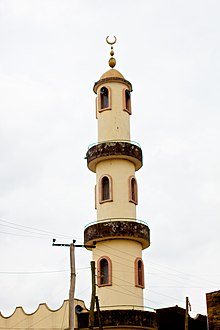
Jimma is a city in Western Ethiopia. Historically, it was a lively market town that attracted all of Ethiopia's diverse ethnic groups as well as people from neighboring kingdoms, buying coffee, perfume and other products.
Understand
[edit]In 2022, Jimma was home to about 207,000 people. The three largest ethnic groups in Jimma are the Oromo (80%), the Amhara (17%) and the Dawro (1%); all other ethnic groups make up 2% of the population. Amharic and Afan Oromo are each spoken by a plurality of inhabitants. The most popular religion practiced in Jimma is Islam, followed by Ethiopian Orthodox Christianity and Protestantism.
History
[edit]What now lies in Jimma's northern suburbs was Jiren, the capital of a late 19th century Oromo kingdom. Formerly named Hirmata, the city during this period was a stopover market town on the trade route between the kingdoms of Shewa and Kaffa, and being only 10 km (6.2 mi) from the palace of King Abba Jifar I.
Jimma was an independent kingdom from 1790 to 1932. Soon after the death of King Abba Jifar II, Ethiopian Emperor Haile Selassie seized the opportunity to annex Jimma and absorb the kingdom into Ethiopia.
The city as it is now was established in 1936 by the Italian Empire . At that time, with the goal of weakening the Ethiopian Orthodox Church, the Italians tried to make Jimma an important center of Islamic learning, and founded an academy that taught fiqh (jurisprudence). During the East African theater of World War II, the Italian garrison at Jimma was one of the last to surrender to the combined Ethiopian, British and Belgian forces, holding out until July 1941.
Climate
[edit]Jimma has a 8-month long wet season from mid-March to mid-October. During the wet season, the city is very cloudy though still quite warm. Jimma is comfortable for most travellers at any time of year, with average highs peaking in February at 29°C and average lows dropping to 17°C in December. Having said that, to avoid the wet season the best time to visit Jimma is from November to February.
Get in
[edit]- 1 Aba Segud Airport (JIM IATA). The airport serving Jimma and nearby destinations. Fly in from Addis Ababa on Ethiopian Airlines.
Get around
[edit]Within the city limits people take bajajs (similar to tuktuks) or “line taxis” that are converted mini vans.
See
[edit]A few buildings have survived from the time of the Jimma Kingdom, including the Aba Jifar Palace.
- Aba Jifar Palace (in the north end of town), ☏ +251 98 813 9955.
- Jimma Museum (Muuziyemii Jimmaa), ☏ +251 91 700 8113.
- 1 Coffee Pot Monument. A big sculpture of an Ethiopian coffee pot.
- Lake Boye (Boye Dam). Of particular interest to birdwatchers. Birdlife at the lake and on its marshy fringes include little grebes, white pelicans and a variety of ducks. Can be explored in a half-day trip from Jimma.
Do
[edit]- Jimma University Mini Stadium, at the southern end of Jimma University. With a capacity of 50,000, the stadium is the biggest sports venue in Jimma. The Mini Stadium is mainly used to host football matches, though athletics (track and field) events are held as well. Jimma Aba Jifar F.C. play their home games in the Ethiopian Premier League. Graduation ceremonies for college students are also held here.
Buy
[edit]Thursday is market day in Jimma. Handmade baskets are an ideal souvenir to take back home.
Eat
[edit]- Biqilti Jimma Cafe.
- 1 Melat Pastry.
Drink
[edit]Sleep
[edit]- Honeyland Hotel, Along Road 5, ☏ +251 47 111 1515. Has reliable hot water.
- 1 Central Jimma Hotel, ☏ +251 47 111 8282. The restaurant at the hotel serves some of the best Ethiopian food in town though the accommodation isn't up to the same standard. The WiFi is patchy and many rooms have ventilation issues.
Connect
[edit]Go next
[edit]- Wolaita Sodo - southeast

